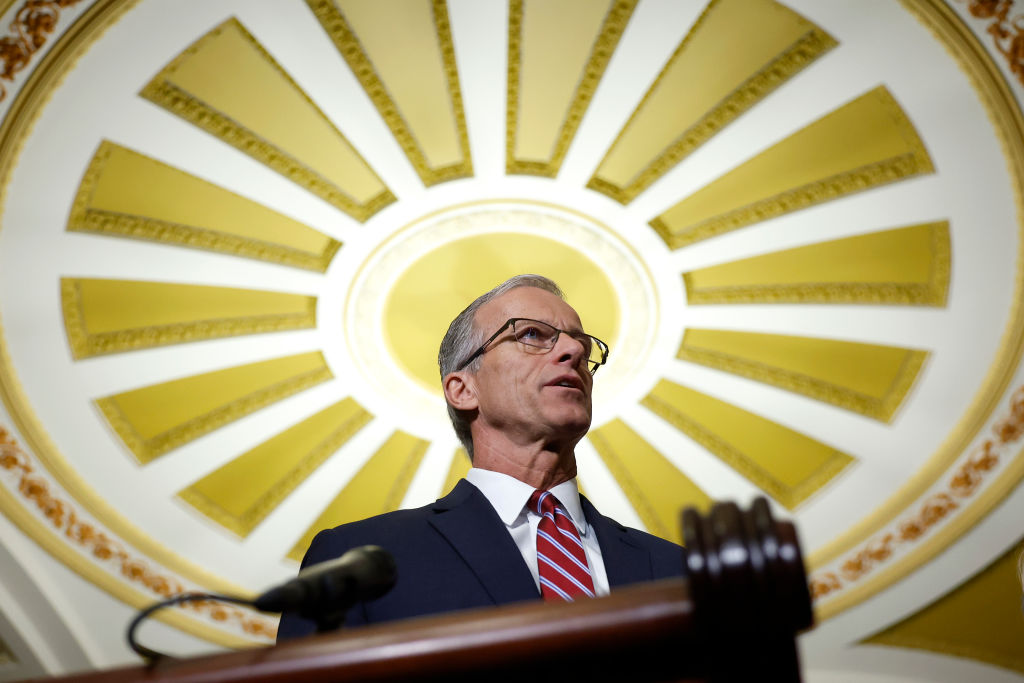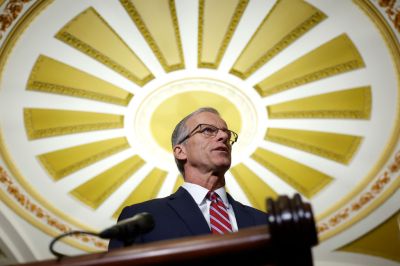Happy Friday! The new Department of Government Efficiency is starting out strong, putting out a tweet—famously the best way to hunt for qualified job applicants—looking for “high-I.Q., small-government revolutionaries” to cut costs in the U.S. government for no pay.
We also consider Dispatch interns “high-I.Q., small-government revolutionaries,” but at least we pay a stipend.
Quick Hits: Today’s Top Stories
- Lebanese authorities said Thursday that at least 12 rescue workers were reportedly killed in the northeastern Lebanese city of Baalbek in an Israeli strike, though the Israel Defense Forces (IDF) did not immediately comment on the allegation. Meanwhile, the IDF on Thursday struck targets in Damascus, Syria, which it said were associated with Palestinian Islamic Jihad. The move was part of what the IDF called an effort to prevent the transfer of weapons from Syria to Lebanon.
- President-elect Donald Trump on Thursday selected two of his personal defense lawyers to serve in his administration. He said he planned to nominate Todd Blanche and Emil Bove to the Department of Justice to serve as deputy attorney general and principal associate deputy attorney general, respectively. Meanwhile, he also selected Dean John Sauer, the former Missouri solicitor general who argued before the Supreme Court on Trump’s behalf regarding presidential immunity, to be the solicitor general, the nation’s top lawyer.
- Trump on Thursday selected former Rep. Doug Collins of Georgia to lead the Department of Veterans Affairs. Collins, who serves as chaplain in the Air Force Reserves, was a top Trump defender in the House during the first impeachment hearing against Trump.
- Florida Attorney General Ashley Moody sued the Federal Emergency Management Agency (FEMA) Thursday, alleging that the government agency discriminated against Florida residents who supported former President Donald Trump. The complaint comes after the agency acknowledged that one of its employees was fired after instructing a canvassing team to skip houses displaying Trump campaign signs in the aftermath of Hurricane Milton.
- The Department of Justice said Wednesday that a California teenager pleaded guilty to making hundreds of “swatting” calls targeting “religious institutions, schools, government officials, and other innocent victims.” The teen also made hoax threats and emergency calls to prompt a significant law enforcement response for profit. He will likely face up to 20 years in prison.
- In a joint statement on Thursday, the FBI and the Cybersecurity and Infrastructure Security Agency (CISA) said China has undertaken “a broad and significant cyber espionage campaign” against commercial telecoms infrastructure. Hackers from the Chinese Communist Party have successfully stolen customer call records from compromised telecommunications companies, accessed the phones of people associated with politics and the government, and lifted surveillance data meant for U.S. law enforcement agencies. The agencies said they are continuing to investigate. Last month, officials said that Chinese hackers had targeted the phones of Sen. J.D. Vance, former President Donald Trump, and Vice President Kamala Harris.
- ABC News reported Thursday the House Ethics Committee investigating former Rep. Matt Gaetz of Florida heard testimony from a woman who said that Gaetz had sex with her when she was 17 years old and in high school. According to the allegations, Gaetz was a member of Congress at the time. The Florida congressman resigned on Wednesday after President-elect Donald Trump named him as his nominee for attorney general, just days before the House Ethics panel was reportedly set to vote on whether to release its report. The woman, now in her 20s, reportedly met Gaetz through Joel Greenberg, the former Seminole County, Florida, tax collector who is serving an 11-year sentence related to sex trafficking. Republican Sen. John Cornyn, who sits on the Judiciary Committee, said he wants to see the results of the ethics probe as part of Gaetz’s confirmation hearing.
- President-elect Donald Trump on Thursday named Robert F. Kennedy Jr. to lead the Department of Health and Human Services, which oversees agencies responsible for public health like the Food and Drug Administration, the National Institutes of Health, and the Centers for Disease Control and Prevention. It’s also the agency that administers Medicare and Medicaid. RFK Jr. is a leading anti-vaccine conspiracy theorist and ran for president as an independent on a platform focused on overhauling the food and health infrastructure in the U.S. “Mr. Kennedy will restore these Agencies to the traditions of Gold Standard Scientific Research, and beacons of Transparency, to end the Chronic Disease epidemic, and to Make America Great and Healthy Again!” Trump said in a post announcing RFK Jr.’s nomination.
The Senate’s New Boss

Senate leadership just got a little taller.
John Randolph Thune, the senior senator from South Dakota, won the Senate Republican conference leadership election on Wednesday. The former high school and college basketball star stands at a cool 6 feet, 4 inches. But with Sen. Tom Cotton, a 6-foot-5-inch Arkansas Republican, becoming conference chair—the No. 3 position in the majority—Thune is the runner-up in the leadership team’s height rankings.
Still, if the conference chose leaders via pickup basketball games instead of secret ballots, the results probably wouldn’t have been too different.
Thune defeated Sens. John Cornyn of Texas and Rick Scott of Florida in two rounds of voting this week to succeed Sen. Mitch McConnell—the longest-serving party leader in Senate history who decided earlier this year to retire from leadership. Thune’s election represents both a break from and continuation of McConnell’s leadership in a party that has only become more responsive to the whims of President-elect Donald Trump since the GOP lost the Senate in 2020.
When McConnell first announced his retirement from leadership in February, there was initially a three-way race to replace him among the three Johns—Thune, Cornyn, and Sen. John Barrasso of Wyoming. Barrasso quickly took himself out of the running and launched a bid instead for majority whip—the No. 2 spot in leadership, which he secured on Wednesday.
The leadership race seemed to be a battle between Thune and Cornyn, with the former slightly favored to win. But a late-breaking push for Sen. Rick Scott of Florida made waves over the weekend. Scott joined the leadership race in May, pitching himself as an anti-establishment candidate more closely aligned with Trump. He also mounted a failed challenge to McConnell’s leadership in 2022. Advisers close to the president-elect, including Elon Musk and Donald Trump Jr., lined up behind Scott, as did a slew of MAGA influencers like Laura Loomer and Tucker Carlson.
Though Trump himself didn’t publicly endorse any candidate in the contest, he did throw a wrench in the works when he insisted on Sunday that any leadership candidate “must agree to Recess Appointments” for his nominees to Senate-confirmed posts. Scott made haste to pass the litmus test. Thune and Cornyn both put out more measured statements, pledging to do whatever needed to be done to quickly confirm the president-elect’s picks and agreeing that the recess maneuver was an option on the table—but in the context of any Democratic blockade on appointments.
Scott said Monday he believed he would get 27 votes, but he received only 13 Wednesday and was knocked out in the first round. The burst of outside backing for Scott reportedly backfired, irritating some senators who resented the online pressure directed at them from MAGA influencers. A similar dynamic played out last fall in the House with Rep. Jim Jordan’s failed bid to become speaker.
Thune won the second-round vote with the support of 29 of his colleagues while Cornyn received 24 votes. The narrow margin reflected the similarities between the two. Both are McConnell acolytes solidly in the institutionalist mold. Both served as the whip—the conference’s vote-counter—with Thune currently in the role only because Cornyn was term-limited out of the position. “Directionally, they’re very similar,” Liam Donovan—a lobbyist and former Republican Senate campaign operative who worked for Cornyn—said ahead of the vote. “They’re both very well liked.”
“Thune reads as the continuity pick, if only by virtue of being the sitting whip, but that’s just about timing,” he added. Cornyn said Thursday that Thune has his complete support and “there’s no daylight between us.”
Thune’s victory likely came down to personal factors and his track record of listening to his colleagues. “For a lot of people, it was the sense of comfort with John Thune being able to represent what we believe,” Sen. Mike Rounds, a fellow South Dakotan, said after the election. “John Thune has consistently done that, and he’s done it during a time in which President Trump was also in office before.”
The 63-year-old began his political career as a congressman, elected to represent South Dakota’s at-large congressional district in 1996, where he served for three terms before running for a Senate seat in 2002. He narrowly lost his race to the Democratic incumbent Tim Johnson. Thune ran for Senate again in 2004 and defeated then-Democratic Minority Leader Tom Daschle, the first time an incumbent party leader had been unseated in more than a half-century.
Once in the Senate, Thune worked his way up the leadership chain, eventually becoming McConnell’s deputy. Colleagues grew to appreciate Thune in that role, particularly in light of McConnell’s health scares last year, including a fall that kept him away from the Senate for nearly six weeks. Sen. Markwayne Mullin, a Republican of Oklahoma and Thune backer, said last week, “We saw that, when Mitch wasn’t able to be there, how Thune handled himself and the way he really let the conference talk it out and make decisions.”
But, “Thune is not McConnell, and he has a different type of leadership style than that,” Mullin said Wednesday.
In his first floor speech since winning the leadership contest, Thune signaled he intended to move away from McConnell’s top-down style and solicit more input from rank-and-file members. “The leader’s office will be a resource, not a roadblock, for members seeking to achieve their legislative goals,” he said on Thursday in his first floor speech since winning the leadership contest. Thune said he would empower committees and open up the legislative process to more amendments that allow “all members of the Senate” to “have a voice in final legislation through amendments on the floor.”
Likely the greatest challenge for Thune—as it was for McConnell—will be navigating his relationship with Trump. The president congratulated Thune on Wednesday, saying, “He moves quickly, and will do an outstanding job.” Thune tried to draw a through-line between former President Ronald Reagan and Trump in his floor speech Thursday, suggesting they shared the same kind of “optimism and faith in our country.” (When McConnell announced his retirement from the Senate floor in February, he name-dropped Reagan at least five times but never mentioned Trump by name.)
The incoming leader has a checkered history with Trump. Thune was the first Republican leader to call for Trump to quit the 2016 presidential race after the release of the Access Hollywood tape. He rejected early claims of voter fraud in the 2020 election, pushed Republicans to accept the election’s outcome, and opposed the attempt to block certification of the results. After January 6, Thune voted to acquit Trump but insisted the vote was not an “exoneration” of Trump. “What former President Trump did to undermine faith in our election system and disrupt the peaceful transfer of power is inexcusable,” he said in a statement at the time.
Trump wanted to punish Thune for not going along with his stolen election agenda. “RINO John Thune, ‘Mitch’s boy,’ should just let it play out,” Trump wrote on Twitter in December 2020. “He will be primaried in 2022, political career over!!!” Trump wanted South Dakota Gov. Kristi Noem—Trump’s current nominee to lead the Department of Homeland Security—to take Thune’s seat in a primary challenge, but she refused. After Trump’s attacks, Thune even considered retirement and delayed announcing his 2022 reelection campaign. But he got in the race and secured a fourth term, breaking the “curse” of South Dakotan senators losing reelection after three terms.
In the 2024 GOP presidential primary, Thune initially backed the short-lived bid of his colleague, South Carolina Sen. Tim Scott. But after Trump’s win in the South Carolina primary, Thune endorsed Trump on February 25—a month after Scott himself had thrown his support behind Trump and just three days before McConnell announced his retirement plans.
“I want to do hard things, but only if you guys agree or the majority of the conference agrees,” Thune reportedly told the conference the night before the leadership vote. “And only if we can persuade the Republican president to work with us.”
Thune’s first challenge could be Trump’s polarizing nominations awaiting Senate confirmation after the new Senate is sworn in. He said his first priority in January will be confirming the nominees on an “aggressive schedule.” But selections like Rep. Matt Gaetz for attorney general on Wednesday and Robert F. Kennedy Jr. to lead the Department of Health and Human Services on Thursday have already sparked public skepticism from a handful of Republican senators.
Thune explained Thursday that his leadership philosophy is inspired by his time on the basketball court and a key lesson his dad imparted to him. “He hated ball hogs,” Thune said of his late father—a basketball star himself and a decorated World War II fighter pilot. “He always believed if there was someone else who had a better shot than you did that you got him the ball, and that’s my goal as leader: to pass the ball to the best-positioned player, to empower everybody on the team.”
We’ll see how successful that philosophy can be in pursuing the legislative agenda of a president who, if nothing else, remains a ball hog.
Worth Your Time
- The Ivy League’s 1950s move toward “meritocratic” admissions broke … almost everything, David Brooks argued in The Atlantic. “In some ways, we’ve just reestablished the old hierarchy rooted in wealth and social status—only the new elites possess greater hubris, because they believe that their status has been won by hard work and talent rather than by birth,” Brooks wrote. “The sense that they ‘deserve’ their success for having earned it can make them feel more entitled to the fruits of it, and less called to the spirit of noblesse oblige. … James Conant and his colleagues dreamed of building a world with a lot of class-mixing and relative social comity; we ended up with a world of rigid caste lines and pervasive cultural and political war. Conant dreamed of a nation ruled by brilliant leaders. We ended up with President Trump.”
- What happened to basketball uniforms? “Nike’s tenure as league outfitter has reduced the raw number of jerseys teams have, but has scrambled who wears what, when — and introduced the ‘City Edition,’ giving space for teams to dress as different teams entirely,” Tyler Machado wrote for The Pudding. “Turning on a random NBA game can now be a disorienting experience to the casual or even the diehard fan. The viewer may ask themselves: which team is which, again? Who’s this team in black and neon green, or a brown and teal?” Scroll through the beautiful visuals to see how basketball fashion for your favorite team has evolved.
Presented Without Comment
Associated Press: Satire Publication The Onion Buys Alex Jones’ Infowars at Auction With Sandy Hook Families’ Backing
In the Zeitgeist
If you’ve ever wondered what enormous wealth and a deep love of your wife can get you, now you know that it’s Mark Zuckerberg collaborating with T-Pain on an acoustic version of Lil Jon & The East Side Boyz’s “Get Low.” We listened to it; so must you.
Toeing the Company Line
- In the newsletters: Will argued that there are lots of ways to make government better even if Vivek Ramaswamy and Elon Musk are unlikely to eliminate trillions in spending, and Nick doubled down on his position that as bad as Trump’s Cabinet picks are, they should be confirmed—even Matt Gaetz.
- On the site: Kevin puts Marco Rubio on the “Mount Rushmore of Putzes,” Drucker reports on the Senate’s deference to Trump, and Joe Polidoro explains the actual risks behind fluoridation.
Let Us Know
How do you expect the new Senate leadership to interact with Trump?








Please note that we at The Dispatch hold ourselves, our work, and our commenters to a higher standard than other places on the internet. We welcome comments that foster genuine debate or discussion—including comments critical of us or our work—but responses that include ad hominem attacks on fellow Dispatch members or are intended to stoke fear and anger may be moderated.
With your membership, you only have the ability to comment on The Morning Dispatch articles. Consider upgrading to join the conversation everywhere.